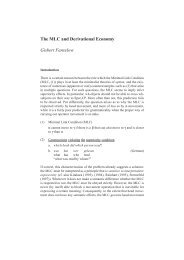Connectionist Modeling of Experience-based Effects in Sentence ...
Connectionist Modeling of Experience-based Effects in Sentence ...
Connectionist Modeling of Experience-based Effects in Sentence ...
Create successful ePaper yourself
Turn your PDF publications into a flip-book with our unique Google optimized e-Paper software.
2.5 Forgett<strong>in</strong>g <strong>Effects</strong><br />
related tasks. S<strong>in</strong>ce there is no such evidence for a language specific memory span, a<br />
pure DLT-<strong>based</strong> hypothesis cannot account for the non-existence <strong>of</strong> the forgett<strong>in</strong>g effect<br />
<strong>in</strong> German. There have to be additional factors that affect the robustness <strong>of</strong> the VP2<br />
prediction representation.<br />
The most promis<strong>in</strong>g explanation is that process<strong>in</strong>g is affected by certa<strong>in</strong> languagespecific<br />
grammatical properties. Vasishth et al. (2008) mention two possibilities how this<br />
could be come about. a) The robustness <strong>of</strong> the verb representation is directly specified by<br />
the same parameters that shape the grammar and hence the production-<strong>based</strong> corpus<br />
regularities. b) On the other hand, the more robust representation could be due to<br />
a more effective process<strong>in</strong>g caused by read<strong>in</strong>g skill, which is affected by the mentioned<br />
corpus regularities and not by the parameters directly. The first possibility is matched by<br />
an expectation-<strong>based</strong> account that directly depends on grammatical properties. Also a<br />
canonicity account would predict SOV structures to be easier <strong>in</strong> German than <strong>in</strong> English.<br />
The alternative <strong>of</strong> read<strong>in</strong>g skill is accounted for by an experience-<strong>based</strong> approach.<br />
Expectation<br />
A door to language-specific effects could be antilocality. Antilocality has been observed<br />
predom<strong>in</strong>antly <strong>in</strong> head-f<strong>in</strong>al languages like German (Konieczny, 2000) and H<strong>in</strong>di (Vasishth<br />
and Lewis, 2006b). The seem<strong>in</strong>g restrictedness <strong>of</strong> these effects to head-f<strong>in</strong>al languages<br />
has lead to the suggestion that the sentence-f<strong>in</strong>al verb <strong>in</strong> these languages is<br />
higher expected than <strong>in</strong> non-head-f<strong>in</strong>al languages. However, a recent study by Jaeger<br />
et al. (2008) shows antilocality effects <strong>in</strong> English, which is not head-f<strong>in</strong>al. The crossl<strong>in</strong>guistic<br />
explanation is that the expectation for a verb <strong>in</strong>creases with more <strong>in</strong>terven<strong>in</strong>g<br />
material. The longer the distance between the dependent and the expected head the<br />
less likely it becomes that even more adjunctive material will <strong>in</strong>tervene before the head.<br />
Additionally, <strong>in</strong> most cases the <strong>in</strong>terven<strong>in</strong>g material narrows the possible candidates for<br />
the head, which lowers surprisal even more. The fact that the associated speed-up at the<br />
verb shows slightly different patterns <strong>in</strong> English and German encourages an expectation<strong>based</strong><br />
account for a language-specific forgett<strong>in</strong>g effect. For example it is imag<strong>in</strong>able that<br />
<strong>in</strong> head-f<strong>in</strong>al languages the prediction is more precise regard<strong>in</strong>g the exact location <strong>of</strong> the<br />
verb, whereas <strong>in</strong> other languages head-f<strong>in</strong>ality is too rare to provide exact verb location<br />
statistics <strong>in</strong> that case.<br />
<strong>Experience</strong><br />
The robustness <strong>of</strong> representations could be shaped by experience. An experience-<strong>based</strong><br />
account assumes that the reader adapts process<strong>in</strong>g strategies to <strong>of</strong>ten occurr<strong>in</strong>g structures.<br />
In result, German readers should be more skilled on head-f<strong>in</strong>al structures than<br />
English readers. An explanation <strong>based</strong> on coarse-gra<strong>in</strong>ed corpus frequencies would be<br />
equivalent to a canonicity approach. German, be<strong>in</strong>g an SOV language exhibits more<br />
head-f<strong>in</strong>al structures than English, predict<strong>in</strong>g easier process<strong>in</strong>g. But earlier discussions<br />
45
















